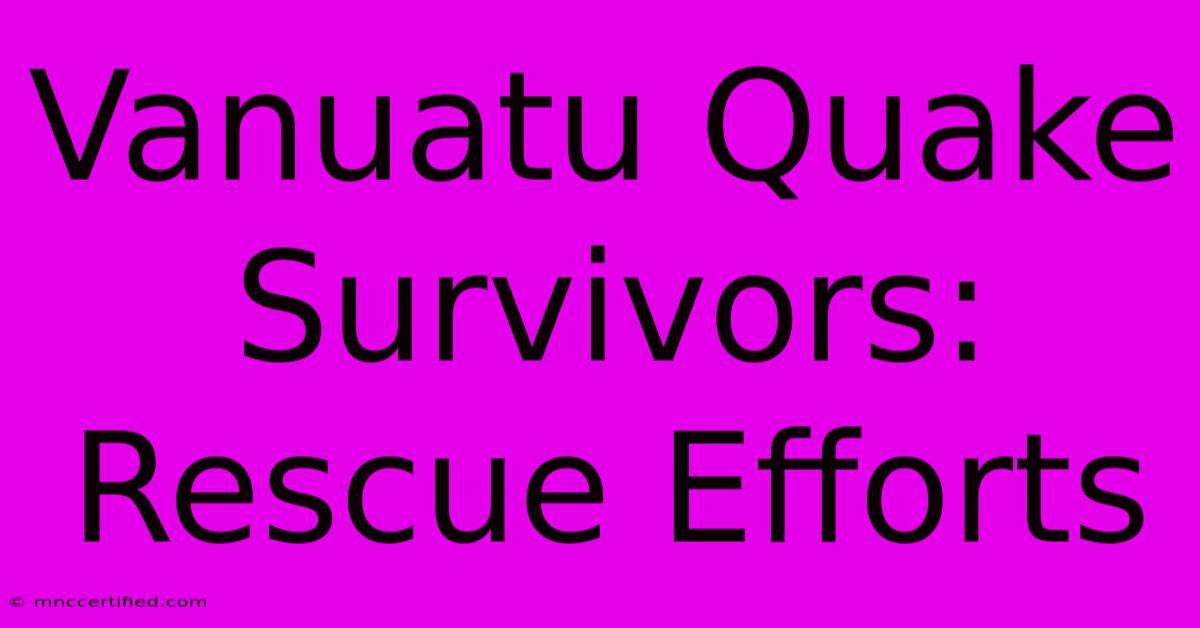Vanuatu Quake Survivors: Rescue Efforts

Table of Contents
Vanuatu Quake Survivors: Rescue Efforts and the Road to Recovery
The recent earthquake that struck Vanuatu has left a trail of devastation, highlighting the urgent need for effective rescue efforts and long-term recovery plans. This article delves into the immediate aftermath of the quake, examining the challenges faced by rescue teams and the resilience of the Vanuatu people in the face of adversity. We'll also explore the ongoing efforts to provide aid and support to those affected, and the crucial role of international collaboration in disaster response.
Immediate Aftermath: A Race Against Time
The earthquake, registering a significant magnitude, caused widespread damage across several islands in the Vanuatu archipelago. Rescue efforts immediately commenced, focusing on:
- Locating survivors: Teams utilized specialized equipment, including search dogs and advanced listening devices, to locate individuals trapped under rubble. The challenging terrain and the extent of the damage significantly hampered these initial rescue operations.
- Providing medical assistance: Injured survivors required immediate medical attention, demanding a swift and organized response from medical teams. The limited medical resources available in some affected areas presented a considerable obstacle.
- Securing essential supplies: Access to clean water, food, and shelter became critical, with the destruction of infrastructure hindering the distribution of aid. The logistical challenges of reaching remote islands added further complexity.
Challenges Faced by Rescue Teams
Rescue teams faced numerous challenges in the wake of the earthquake, including:
- Geographical limitations: Vanuatu's dispersed islands and challenging terrain made accessing affected areas difficult, delaying rescue efforts. Helicopter rescues proved essential but were limited by weather conditions.
- Resource constraints: The limited resources available within Vanuatu necessitated significant international support to adequately address the scale of the disaster. International aid was crucial in supplementing local efforts.
- Communication disruptions: Damage to communication infrastructure hampered coordination among rescue teams and the dissemination of vital information to affected communities. Restoring communication networks was paramount.
The Resilience of the Vanuatu People
Despite the immense challenges, the resilience of the Vanuatu people shone through. Communities rallied together, offering mutual support and assisting in rescue efforts. Community resilience played a critical role in the immediate aftermath, demonstrating the strength of local networks. This inherent strength underscores the importance of supporting community-based recovery initiatives.
The Road to Recovery: Long-Term Aid and Support
The immediate rescue efforts are only the first phase of a long and complex recovery process. The road ahead requires sustained commitment to:
- Reconstruction and rebuilding: Rebuilding homes, infrastructure, and essential services is a crucial, long-term undertaking requiring significant financial investment and international collaboration. International funding will be vital for this process.
- Economic recovery: The earthquake significantly impacted the Vanuatu economy, particularly in the tourism sector. Supporting economic recovery requires strategic investments to revitalize livelihoods and boost economic activity.
- Mental health support: The trauma experienced by survivors requires ongoing mental health support to facilitate healing and recovery. Providing access to psychological services is crucial for long-term well-being.
The Importance of International Collaboration
The success of rescue efforts and the long-term recovery depend heavily on international collaboration. International aid organizations, governments, and individuals play a crucial role in:
- Providing financial assistance: Donations and funding are vital for supporting rescue efforts, reconstruction, and recovery initiatives.
- Deploying specialized teams: International teams with expertise in search and rescue, medical care, and engineering are essential for effective response.
- Facilitating logistics: Coordinating the delivery of essential supplies and equipment requires international cooperation.
The earthquake in Vanuatu serves as a stark reminder of the devastating impact of natural disasters. While the immediate rescue efforts were vital, the road to recovery will be a lengthy process requiring sustained commitment from the international community and the unwavering resilience of the Vanuatu people. By understanding the challenges and focusing on coordinated efforts, we can help Vanuatu rebuild and emerge stronger from this tragedy.

Thank you for visiting our website wich cover about Vanuatu Quake Survivors: Rescue Efforts. We hope the information provided has been useful to you. Feel free to contact us if you have any questions or need further assistance. See you next time and dont miss to bookmark.
Featured Posts
-
Diane Delano Dies At 67 Northern Exposure Star Passes
Dec 18, 2024
-
Vanuatu Hit By Deadly Earthquake
Dec 18, 2024
-
Cubs Pitcher Cody Poteet Scouting Report
Dec 18, 2024
-
Rlusd Launch Xrp Price Impact
Dec 18, 2024
-
Showdown In Vegas Photos Videos
Dec 18, 2024